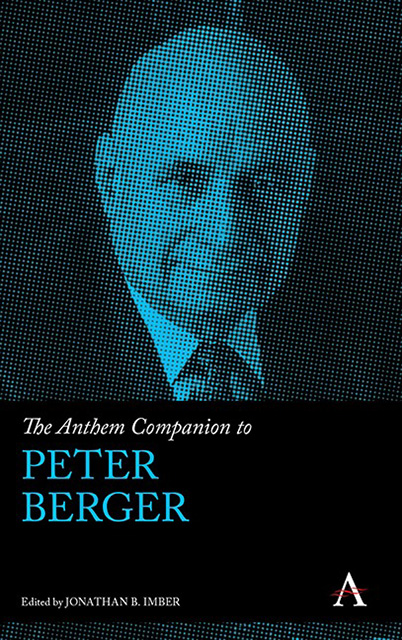Book contents
- Frontmatter
- Contents
- Introduction
- Chapter 1 Plurality, Choice, and The Dynamics of Doubt
- Chapter 2 Peter L. Berger and The Challenge of Modern Pluralism
- Chapter 3 Making Peace With Pluralism In America
- Chapter 4 Religion and Secularity in A Desecularizing Russia
- Chapter 5 The Moral Limits of Religious Pluralism
- Chapter 6 Peter L. Berger and Arnold Gehlen: Secularization, Institutions and Social Order
- Chapter 7 Peter L. Berger’s Three Religions
- Chapter 8 Objectivation: The Material Heritage of Peter L. Berger
- Chapter 9 Peter L. Berger’s The Social Construction of Reality
- Chapter 10 The Untaken Road to Phenomenological Sociology
- Chapter 11 Cheering for Capitalism
- Chapter 12 Peter L. Berger and Economic Sociology
- Chapter 13 Peter L. Berger Changed The Direction of My Work … and My Life
- Chapter 14 Peter L. Berger On Religion as Choice Rather Than Fate
- List of Contributors
- Index
Chapter 12 - Peter L. Berger and Economic Sociology
Published online by Cambridge University Press: 17 October 2023
- Frontmatter
- Contents
- Introduction
- Chapter 1 Plurality, Choice, and The Dynamics of Doubt
- Chapter 2 Peter L. Berger and The Challenge of Modern Pluralism
- Chapter 3 Making Peace With Pluralism In America
- Chapter 4 Religion and Secularity in A Desecularizing Russia
- Chapter 5 The Moral Limits of Religious Pluralism
- Chapter 6 Peter L. Berger and Arnold Gehlen: Secularization, Institutions and Social Order
- Chapter 7 Peter L. Berger’s Three Religions
- Chapter 8 Objectivation: The Material Heritage of Peter L. Berger
- Chapter 9 Peter L. Berger’s The Social Construction of Reality
- Chapter 10 The Untaken Road to Phenomenological Sociology
- Chapter 11 Cheering for Capitalism
- Chapter 12 Peter L. Berger and Economic Sociology
- Chapter 13 Peter L. Berger Changed The Direction of My Work … and My Life
- Chapter 14 Peter L. Berger On Religion as Choice Rather Than Fate
- List of Contributors
- Index
Summary
Peter L. Berger (1928–2017) was a towering intellectual figure in the field of sociology and public intellectual life from the second half of the twentieth century into the first two decades of the twenty-first century. His Invitation to Sociology introduces generations of students to the field. And, what better introduction could students have to the discipline. Berger was just simply fascinated by human beings in all their various endeavors, and ways of living. In his autobiographical reflections, Adventures of an Accidental Sociologist (2011), he explains how he was merely interested in finding out about American life and the course he enrolled in at the New School taught sociology through the novels of Honore de Balzac. These novels of Balzac captured the comedic drama of life in Paris, and in so doing provided a window into the everyday world of ordinary individuals. Berger was hooked. Sociology became his disciplinary home, but that was just a bureaucratic designation. He was a social scientist, an observer of humanity, and a critical analyst of social relations and their impact on practice and performance in religious life, in commercial life, and in social life in general.
The subtitle of Berger’s fascinating memoir is: How to Explain the World Without Becoming a Bore. For anyone who has read Peter L. Berger, listened to him give a lecture, or had the opportunity to visit and converse with him, the one obvious fact is that he was never boring and certainly never a bore. He was simply one of the more fascinating people you ever encountered in this academic life. Charming and self-effacing, Berger was a great storyteller and loved to use jokes to illustrate profound points. He did not rely on academic jargon to make his points, but instead wrote intelligently in plain language—this is as true for The Social Construction of Reality as for Invitation to Sociology (1966). He simply invited his readers to join him in an intellectual journey to understand mankind in all walks of life and in all his endeavors—even those that most of us would like to keep behind closed doors and hidden from public examination. He was simply curious about the way we live, work, play, love, pray, etc.
- Type
- Chapter
- Information
- The Anthem Companion to Peter Berger , pp. 137 - 142Publisher: Anthem PressPrint publication year: 2023

